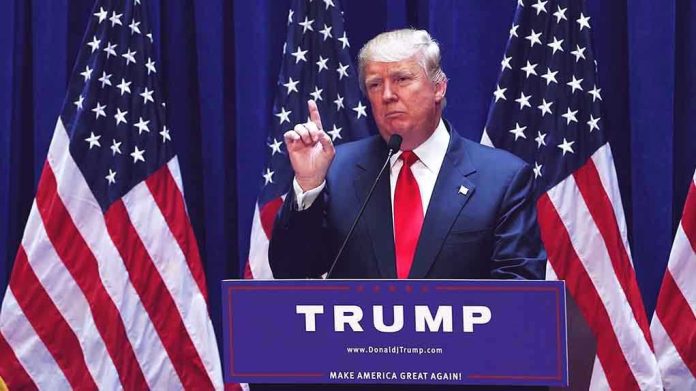
China’s sudden agreement to ban all fentanyl precursor chemicals signals a major win for Trump’s America, but questions remain over enforcement and long-term impact.
Story Snapshot
- FBI Director Kash Patel accomplished a historic agreement with China to ban 13 fentanyl precursor chemicals, targeting the root of the opioid crisis.
- President Trump’s direct diplomacy with Xi Jinping drove the breakthrough, marking the strongest U.S. stance yet against foreign-fueled drug epidemics.
- The new controls disrupt Mexican drug cartels and promise immediate reductions in fentanyl trafficking.
- Experts and officials warn that strict enforcement and ongoing oversight will be crucial to protect American lives and values.
Trump’s Direct Diplomacy Forces China’s Hand on Fentanyl
In November 2025, FBI Director Kash Patel made headlines with a high-stakes, unannounced trip to Beijing, pressuring Chinese law enforcement to take decisive action against the export of fentanyl precursor chemicals.
The visit was a direct result of President Trump’s summit with President Xi Jinping, where America’s opioid crisis was front and center. Under Trump’s leadership, the administration demanded concrete steps, ultimately leading to China’s first-ever comprehensive ban on all 13 fentanyl precursor chemicals.
This move is widely seen as a landmark shift in U.S.-China relations, pushing back against years of weak enforcement and diplomatic stalling.
Patel’s visit marked the first time in over a decade that an FBI director set foot in China, underscoring the urgency and gravity of the crisis.
Details released following the trip show that Patel met with top officials from the Chinese Ministry of Public Security, hammering out controls not only on the chemicals themselves but also on seven key chemical subsidiaries linked to the global fentanyl trade.
The timing was critical: with tens of thousands of American lives lost annually to opioid overdoses, Trump’s administration made clear that failure to act would mean stiffer tariffs and economic consequences for Beijing. The message sent was unmistakable—America will no longer tolerate foreign governments fueling its drug epidemic.
Agreement Details and Immediate Impact on Drug Trafficking Networks
The resulting agreement is unprecedented in scope. China’s Ministry of Public Security committed to fully designating the banned substances and implementing controls on critical chemical companies.
The U.S. Treasury Department, in tandem, announced a bilateral working group to oversee enforcement, signaling a new era of law enforcement cooperation. Mexican drug cartels, which depend on Chinese precursors for their synthetic opioid operations, now face a disrupted supply chain.
Law enforcement experts believe this will trigger a noticeable drop in fentanyl trafficking into the United States, at least in the short term. The Trump administration’s aggressive posture—backed by economic sanctions and diplomatic leverage—proved essential in securing these concessions from China.
Despite the optimism, officials stress that the agreement’s success hinges on rigorous enforcement and continued vigilance. Patel’s public statement credited the “tremendous team” led by President Trump, the Attorney General, and Ambassador Purdue in China for the achievement, but also acknowledged the challenges ahead.
Drug policy experts and law enforcement leaders praise the breakthrough but caution that loopholes, corruption, and shifting tactics among traffickers could undermine progress if not met with ongoing oversight. For American families devastated by the opioid crisis, the hope is that this deal delivers real results and not just diplomatic headlines.
Conservative Values and Constitutional Safeguards in the Fight Against Fentanyl
For conservative Americans, Trump’s crackdown on foreign drug pipelines is a clear defense of traditional values—protecting families, upholding the rule of law, and rejecting policies that enable government overreach or undermine the Constitution.
The administration’s refusal to accept weak enforcement reflects a wider frustration with prior leftist policies that failed to address the roots of illegal immigration, fiscal mismanagement, and globalist agendas.
By demanding accountability from China, Trump’s team champions American sovereignty and personal liberty, sending a message that foreign adversaries will not be allowed to erode public safety or family stability.
As the agreement moves into the enforcement phase, the conservative base will be watching closely. The Trump administration’s track record—record deportations, stable inflation, and landmark legislation like the Halt Fentanyl Act—has set a new standard for decisive action.
Still, the fight is far from over. Vigilance against constitutional threats, government overreach, and the persistent dangers of global drug trafficking remains paramount. American families and patriots expect results, not rhetoric, and will hold leaders accountable for delivering on these promises.
Sources:
CBS News: Kash Patel FBI China Fentanyl
RNZ: FBI Chief Visited China to Talk Fentanyl
Apple Podcasts: Kash Patel to Visit China to Discuss Fentanyl
Economic Times: Kash Patel China Trip
The Well News: China Agrees to Tighten Controls on Precursors to Fentanyl














